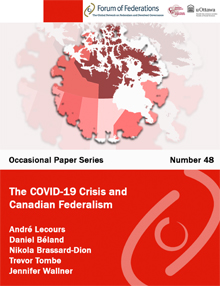Bibliothèque

Language:
EnglishTopic:
COVID-19 and Federalism, Emergency Management, Intergovernmental Relations, Public SecurityCollection:
Série d'articles occasionnelsCountries:
CanadaAuthors:
The COVID-19 Crisis and Canadian Federalism3 Abstract This paper examines the potential impact of the COVID-19 crisis on six key dimensions of Canadian federalism: social protection; intergovernmental relations; fiscal federalism; emergency powers; Québec nationalism and politics; and regional alienation in Alberta. On social protection, it suggests that federal politicians and civil servants might explore implementing incremental reforms of Employment Insurance and other components of federal income support as a result of the pandemic. We find little evidence of transformative change in intergovernmental relations, although their frequency has greatly increased during the COVID-19 crisis. From a fiscal perspective, the pandemic has amplified pre-existing pressures for increased healthcare transfers and reform to the fiscal stabilization program. The decentralized and collaborative handling of the crisis has reduced concerns of abuses of power and set a major precedent in terms of respecting provincial autonomy that may have rendered obsolete the Emergencies Act. The COVID-19 crisis is likely to consolidate, if not further the decline of both the independence option and the PQ, as it highlighted, among other things, the fiscal might of the federal government. At the same time, it is likely to sustain, if not aggravate feelings of alienation in Alberta as the province will remain a non-recipient of equalization despite the deterioration of its fiscal situation.

